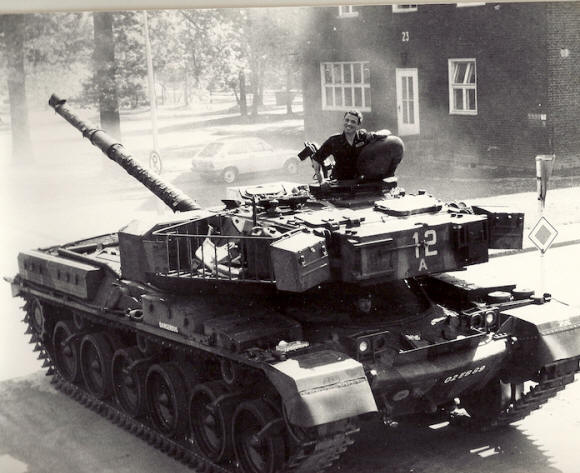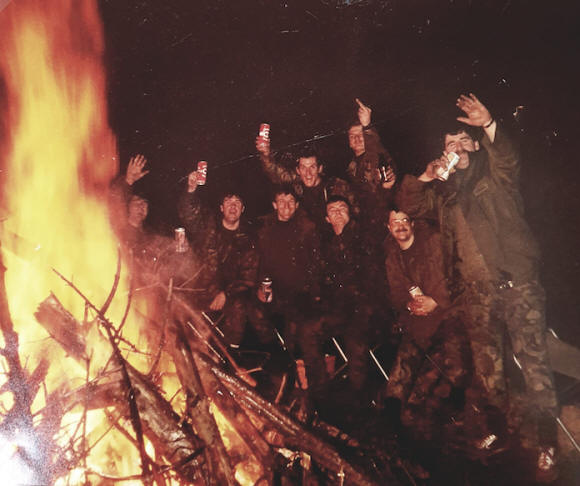|
IT’S HIGH
TIME I talked about the boys. Other Scottish regiments
might have called them the Jocks, but to us in the 4 RTR
Officers’ Mess they were always “the boys”. And they
still are, even though we’re all in our 60s and 70s, and
I suspect it will ever be thus. They were, and are, a
splendid bunch, not perfect (who is?) but generally
hard-working, professional, and endlessly amusing. They
were tough too, not in any thuggish way, but in a
non-complaining manner regardless of how tired, cold or
hungry they might have been. Most hailed from the
Glasgow area or Fife, it seemed, with a smattering of
wild men from the Highlands and islands. I am not much
given to sentimentality, but I’m so pleased I had the
opportunity to get to know all of them.
Being on tanks was a rough life. Aside from the constant
maintenance and repair of the unreliable Chieftain, the
noise and vibration could be exhausting. On exercise we
were filthy despite washing and shaving every morning.
Such was the dust thrown up by the tracks and oil from
the engine our faces often matched the black denims we
wore, and days after returning to camp we still had
“panda eyes” from the ingrained dirt around our eyes. On
the other hand, if you haven’t experienced bouncing over
the countryside in a well crewed tank with the wind in
your hair, and probably a fag in your mouth, then you
haven’t really lived. As Johnston said, “Every man
thinks meanly of himself for not havingbeen a soldier
…”, but that was before tanks were invented. Otherwise
he would have been more specific and added “tank” before
“soldier”!
I don’t think you ever forget your first tank crew.
Although it did change from time to time because of
leave, courses, and postings, the classic crew of my
tank T41 during my lamentably short spell as a troop
leader was: driver, Bob Withington; gunner, George
Gillespie; and loader, Eck McKenzie. The other two tanks
in the troop were commanded by Sneck McBride and John
Barnwell. Together we managed our way through one
complete training season comprising dry training (ie no
live ammunition) at Soltau, gunnery training at Hohne
ranges, and then the full Bhuna – manoeuvre and live
firing in Alberta, Canada. I will be writing more about
the latter two events in due course.
The basic building block of it all were the low-level
troop training drills and exercises which we carried out
first, followed by squadron and then regimental, or
battle group training which upped the ante a bit. Up and
down and across Soltau we went, practising advances to
contact, quick attacks, defensive tactics and that most
difficult skill of all, the withdrawal in contact. At
night we moved into hides in the woods, replenned and
maintained the panzers. If we were lucky we got a moment
or two to relax over a beer or two. We always had
alcohol on our tanks. A standard load if there were such
a thing might be two slabs (one slab = 24 cans) of
Tennents or McEwans on the turret floor and a bottle of
The Famous Grouse in the turret bin. Infantry regiments
who saw our boys drinking on scheme were aghast, but for
us it was normal.
In the late summer/early autumn, when the German farmers
had harvested their crops, there might be a formation
exercise or FTX, when we practised our trade in normal
countryside, driving up roads and through fields, and
sometimes walls and fences, just like we thought we
would for real. These were usually held at Divisional
level – there were four divisions in 1 (Br) Corps at the
time – but sometimes the whole Corps would turn out, and
the “enemy” would be played by the Americans or the
Germans. These were on a different scale altogether and
I’ll be writing about one of them in particular in some
future episode. In all of them we were followed around
by Damage Control (DAMCON) parties who sorted out
compensation for the damage that we caused. Sometimes
the German farmers would stop us and ask us to knock
down a particular wall or barn that needed replacing,
and on at least one such FTX the exercise had to stop
because we ran out of compensation money. Happy days.

A Tank Named Dangerous...
Tanks
were an ‘elf ‘n’ safety’ nightmare, mind,
notwithstanding the designers’ attempts to incorporate
numerous safety devices. You couldn’t fire the gun, for
example, without the loader’s guard being pulled back
into position which shielded him from the recoil. But if
you were on dry training and going cross country at
night, and if your loader was standing behind the breech
making a brew in the boiling vessel (BV*) and you hit a
tree or other obstruction with the gun barrel, it could
recoil and break his pelvis, as happened on at least one
occasion. Or if your gunner fell asleep and the
commander traversed the turret his ankle could be broken
if his feet were in the wrong position. I dropped the
lid on my cupola on my head on more than one occasion,
and people were forever jamming fingers in various
places. Not for nothing did every tank commander carry
four syrettes of morphine round his neck. Saddest of
all, on one or two occasions we lost one of the boys,
usually when a tank tipped over. The drill if that
happened was, counter intuitively, to drop inside the
turret – against the natural instinct to try and jump
out, but if you did that you’d get squished. Not nice.
The highlight of being out on exercise, though, was
undoubtedly the squadron smoker, particularly on Soltau.
The German civilian authorities had imposed a ban on all
tracked movement on the area over the weekend, quite
understandably in retrospect because of the noise, dust
and smoke, so all tank movement stopped and we moved
into hides in the woods for rest and maintenance. We
could get the shower truck into Rheinsehlen Camp for a
cleanup, and then, on Saturday night, came the great
event. The SQMS would arrive with the normal evening
replen of rations and fuel, and also an ample supply of
beer for the boys to purchase. It seemed that one slab –
24-cans-per person – was deemed appropriate.

Jump the fy-err
Meanwhile,
those spared guard and maintenance tasks had been
collecting a vast pile of firewood, maybe not rivalling
the Shankhill Road bonfires on the 12th of July but a
good attempt. After work was done, and after the evening
meal, the squadron would congregate around the vast
pile, sitting on the slabs of beer they had bought, and
the fire would be lit with the help of much oil (“mair
lube, mair lube”) from the tanks. They usually went up
with a “whoosh” and then the fun would begin. As the
boys drank their beers, upon which they were sitting of
course, their perches would become more and more
unstable until they fell off their seats. All the while
the fire was being fuelled by ever more branches and
logs from the surrounding area until there was a danger
that the whole wood would go on fire and burn all our
tanks and equipment with it. Thankfully this never
happened, not in my experience anyway.
As the evening wore on there would be some good natured
banter, usually about burning certain individuals of a
certain caste in the assembled company, but especially
officers, and then at some point the dreaded cry of
“Jump the fy-err!” would be heard, at which point all
sensible officers would quickly retire. Jumping the fy-err
involved taking a running jump over the hopefully
slightly diminished fire and landing safely on the other
side. All the better of you did it stark, bollock naked.
Quite a few of the young bloods didn’t quite make it and
got singed landing short. One of our more spirited young
officers, whom everyone called, and still calls, “The
Wean” because of his youth (shall I name him? Oh, OK I
will; it was Niall Macnaughton) and who had decided to
stay the course, managed the feat in his birthday suit.
Sadly no photographs exist of his triumph.
He does recall, though, that on landing on the far side
of the fy-err he was hosed down with beer by his troop
and rolled in the sandy soil by them as a reward for his
valour. He described to me, just the other day, waking
up naked in his sleeping bag and, holding it round his
waist, hopping round the assorted recumbent bodies that
had fallen asleep around the embers of the fy-err whilst
he recovered his clothes. The scene would resemble the
fall of Stalingrad, with some individuals literally
smouldering in their slumbers having strayed too close
to the still glowing remains. On another famous
occasion, upon return to barracks, one senior NCO’s wife
marched into her husband’s squadron leader’s office and
gave him a piece of her mind about the state in which
her spouse had returned from one such event, badly
bollock-singed as he was.
These were great times, and like all great times you
only realise how great they were when they’re gone.
Today’s army, I understand, would not tolerate similar
behaviour and is altogether more serious and disciplined
about its calling. More’s the pity in many ways, and I
would still bet they aren’t as good as we were.
* One of the few things American “tankers” envied us for
was our BVs, which meant we could conjure up hot food
and drinks without stopping.
To come in Part 9; having run away with myself this
time, next will come ranges and Canada, I promise!.
© Stuart Crawford 2020 |

